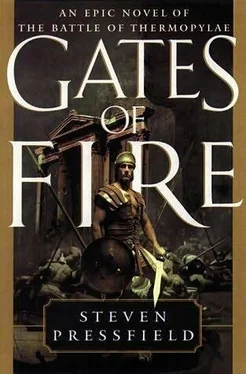Steven Pressfield - Gates of Fire - An Epic Novel of the Battle of Thermopylae
Здесь есть возможность читать онлайн «Steven Pressfield - Gates of Fire - An Epic Novel of the Battle of Thermopylae» весь текст электронной книги совершенно бесплатно (целиком полную версию без сокращений). В некоторых случаях можно слушать аудио, скачать через торрент в формате fb2 и присутствует краткое содержание. Жанр: Историческая проза, на английском языке. Описание произведения, (предисловие) а так же отзывы посетителей доступны на портале библиотеки ЛибКат.
- Название:Gates of Fire: An Epic Novel of the Battle of Thermopylae
- Автор:
- Жанр:
- Год:неизвестен
- ISBN:нет данных
- Рейтинг книги:3 / 5. Голосов: 1
-
Избранное:Добавить в избранное
- Отзывы:
-
Ваша оценка:
- 60
- 1
- 2
- 3
- 4
- 5
Gates of Fire: An Epic Novel of the Battle of Thermopylae: краткое содержание, описание и аннотация
Предлагаем к чтению аннотацию, описание, краткое содержание или предисловие (зависит от того, что написал сам автор книги «Gates of Fire: An Epic Novel of the Battle of Thermopylae»). Если вы не нашли необходимую информацию о книге — напишите в комментариях, мы постараемся отыскать её.
Gates of Fire: An Epic Novel of the Battle of Thermopylae — читать онлайн бесплатно полную книгу (весь текст) целиком
Ниже представлен текст книги, разбитый по страницам. Система сохранения места последней прочитанной страницы, позволяет с удобством читать онлайн бесплатно книгу «Gates of Fire: An Epic Novel of the Battle of Thermopylae», без необходимости каждый раз заново искать на чём Вы остановились. Поставьте закладку, и сможете в любой момент перейти на страницу, на которой закончили чтение.
Интервал:
Закладка:
I was directed to a stone bowl and told to rinse my hands and feet. Several clean linen cloths hung upon a bar; I dried myself and rehung them scrupulously. My heart was hammering, though for the life of me I could not have said why. The maiden Eleiria ushered me inside to the hearth hall, the solitary room, other than Dienekes' and his wife Arete's bedchamber, of which the house was comprised.
All four of Dienekes' daughters were present, including a slumbering toddler and a newborn; the second-eldest, Alexa, now being joined by her sister, both of whom sat to the side and proceeded to card wool as if it were the normal activity for the middle of the night. These maidens were presided over by the lady Arete, who sat with the infant at her breast upon a low uncushioned stool adjacent the hearth.
I discerned at once, however, that it was not Dienekes' lady upon whom I was to attend. Instead, at her side, and more toward the meridian of the room, sat the lady Paraleia, Alexandras' mother, the wife of the polemarch Olympieus.
This mistress began without ceremony to interrogate me on the harrowing her son had received not half an hour earlier in the mess. That she knew of this event at all, and so immediately, was surprise enough. Something in her eyes warned me I must choose my words with care.
The lady Paraleia declared that she was keenly cognizant of and held in profoundest respect the proscription against revealing any exchange spoken within the precincts of a Peers' mess.
Nonetheless I might, without violating the sanctity of the law, yet vouchsafe to her, a mother understandably concerned about her son's welfare and future, some indication, if not of the precise words and actions of the aforesaid event, then perhaps some portion of its tone and flavor.
She inquired by way of motivation, in the identical understated tone with which the Peers of the mess had interro-gated Alexandras, who it was who governed the city. The kings and the ephors, I replied at once, and of course the Laws. The lady smiled and glanced, just for a moment, toward the mistress Arete.
Yes, she said. Surely this must be so.
This was her way of letting me know that the women ran the show and that if I didn't want to find myself permanently back in the farmers' shitfields, I'd better start coughing up a satisfactory dose of information. Within ten minutes she had gotten everything there was to get. I sang like a bird.
She wished, the lady Paraleia began, to know everything her son had done in the hours after he had defied her wishes in the grove of the Twins and set off to follow the army to Antirhion. She grilled me as if I were a spy. The lady Arete did not interrupt.
Her eldest daughters never lifted their eyes toward me nor toward the lady Paraleia, yet they remained in their modest silence riveted to every word. This was how they learned. The lesson today was how to grill a boy in service. How a lady did it. What tone she took, what questions she asked, when her voice rose with a hint of threat and when it lowered to assume a more confidential, candor-evoking tone.
What rations had Alexandras and I taken? What arms? When our food ran out, how had we acquired more? Did we encounter strangers along the way? How did her son comport himself?
How did the strangers respond? Did they show him respect worthy of a Spartan? Did her son's demeanor command it?
The lady assimilated my responses, revealing nothing herself, though it was plain at certain junctures that she disapproved of her son's conduct. Only once did she permit actual anger to invest her tone, that when I acknowledged under compulsion that Alexandras had not secured the name of the boat captain who had ferried and betrayed us. The lady's voice shook. What was wrong with the boy? What had he learned all these years at his father's table and in the common mess? Didn't he see that this reptile, this fisher cap-tain, must be punished, executed if necessary, to teach these scoundrels the price of playing perfidy with the son of a Peer of Lakedaemon? Or if prudence dictated, that he, this boatman, could be exploited to advantage? If war with the Persian came, this blackguard, turned informer, could prove an invaluable source of intelligence for the army. Even if he attempted through falsehood to play the traitor, this could be discerned and valuable knowledge acquired. Why didn't my son find out his name?
Your servant does not know, lady. Perhaps your son did and his servant was unaware of it.
Call yourself I Paraleia scolded me sharply, You're not a slave, don't talk like one.
Yes, lady.
The boy needs something to wet his throat, Mother. This from the maiden Eleiria, with a giggle. Look at him. If his face gets any redder, he'll burst like a pomegranate.
The grilling went on for another hour. Adding to the discomfort I felt on this hot seat was the effect of the lady Paraleia's physical appearance, which bore an uncanny resemblance to that of her son. Like him, the lady was beauti-ful, and like him, her beauty took the unadorned, underplayed Spartan form.
The wives and maidens of my native Astakos, and those of every other city in Hellas, routinely employ cosmetics and facial paint to enhance their comeliness. These ladies are keenly aware of the effect the artificial sheen of their curls or the pink of their lips produces upon any male within range of their charms.
None of this entered into the scheme of the lady Paraleia, nor Arete either. Her peplos robe was split up the side in the Spartan style, revealing her bare leg to the thigh. This in any other city would have been lewd to the point of scandalous. Yet here in Lakedaemon it was unremarkable in the extreme. This is a leg. We women possess them just like you men. For Spartan males to leer at or ogle a lady in this dress would have been unthinkable. They had beheld their mothers and sisters and daughters naked since they were old enough to open their eyes, both in the girls' and women's athletic training and in the festivals and the other women's processions.
Still these ladies, both of them, were not unaware of their personal magnetism and the effect it produced, even upon a boy in service drawn up before them. After all, wasn't Helen herself a Spartan? The wife of Menelaus, she whom Paris had carried off to Troy, the cause of endless suffering among Trojans and Greeks, and for whose peerless beauty's sake so many brave Achaeans lost their lives in Troy far from their native country.
Spartan women surpass for beauty all others in Hellas, and not the least of their charms is that they make so little play upon it. Aphrodite is not their goddess, but Artemis Huntress. Look at the loveliness of our hair, their bearing seems to say, which reflects the lamplight not by the artifice of the cosmetician's art, but by the sheen of health and the luster of virtue. Look in our eyes which embrace a man's, neither lowering in contrived modesty nor fluttering behind dyed lashes like Corinthian whores. Our legs we groom not in the boudoir with wax and myrtle, but under the sun in the race and upon the Ring.
They were dams, these ladies, wives and mothers whose primary calling was to produce boys who would grow to be warriors and heroes, defenders of the city. Spartan women were brood mares, the pampered damsels of other cities might scoff, but if they were mares, they were racers, Olympic champions. The athletic glow and vigor which the gynaikagoge, the women's training discipline, produced in them was powerful stuff and they knew it.
Standing before these women now, my thoughts despite all efforts were wrung back into the past, to Diomache and to my mother. I saw in memory my cousin's bare legs flashing strong and well made when we raced after some hare or doe with our dogs sprinting ahead up some rock-strewn slope. I saw the smooth glowing flesh of her arm when she drew the bow, her eyes that shrank before nothing and the flush of youth and freedom that suffused the skin of her face when she smiled. I saw again my mother, who was only twenty-six at her death, and whose memory to my eyes was of surpassing gentleness and nobility.
Читать дальшеИнтервал:
Закладка:
Похожие книги на «Gates of Fire: An Epic Novel of the Battle of Thermopylae»
Представляем Вашему вниманию похожие книги на «Gates of Fire: An Epic Novel of the Battle of Thermopylae» списком для выбора. Мы отобрали схожую по названию и смыслу литературу в надежде предоставить читателям больше вариантов отыскать новые, интересные, ещё непрочитанные произведения.
Обсуждение, отзывы о книге «Gates of Fire: An Epic Novel of the Battle of Thermopylae» и просто собственные мнения читателей. Оставьте ваши комментарии, напишите, что Вы думаете о произведении, его смысле или главных героях. Укажите что конкретно понравилось, а что нет, и почему Вы так считаете.












